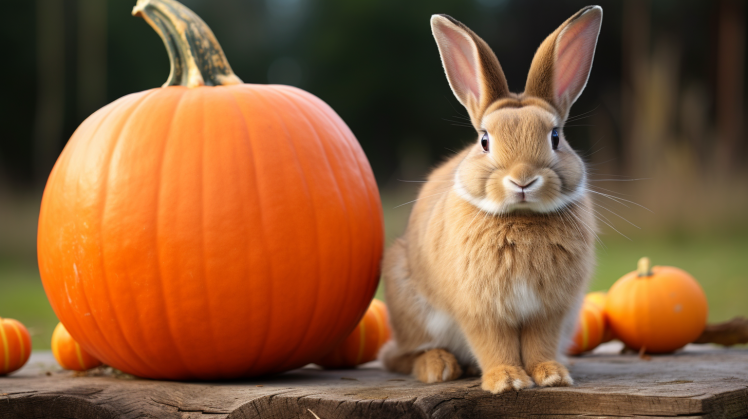Rabbits are adorable and fluffy creatures that require a carefully balanced diet to maintain good health. Their digestive system is highly sensitive, and introducing new foods needs to be done slowly and with caution. As a rabbit owner, you may be wondering, “Can rabbits eat pumpkin?” The answer is yes! In this article, we will delve into the benefits, risks, and precautions associated with feeding pumpkin to rabbits.
Benefits of Feeding Pumpkins to Rabbits
Pumpkins can provide several health benefits to rabbits when offered as an occasional treat. Here are some advantages to consider:
- Nutritional Value: Pumpkins are rich in nutrients like potassium, vitamin A, and dietary fiber. These essential nutrients can promote a healthy digestive system for your furry friends.
- Hydration: Pumpkins have a high water content, making them a great choice for additional hydration, especially during hot summer months. This extra moisture can help keep your rabbit hydrated and prevent dehydration.
- Promotes Dental Health: Chewing on pumpkin can help wear down a rabbit’s constantly growing teeth. The fibrous texture of the pumpkin can provide a satisfying chewing experience and promote good oral hygiene.
Risks and Precautions
While pumpkins can be a healthy addition to a rabbit’s diet, there are some risks and precautions to keep in mind:
- Moderation is Key: Although pumpkins are nutritious, it’s vital to feed them to your rabbit in moderation. Pumpkin should be given as an occasional treat due to its high sugar content. Excessive consumption may lead to weight gain or digestive issues.
- Introduce Slowly: When introducing pumpkin to your rabbit’s diet, it’s essential to start with a small amount and monitor their reaction. Just like humans, rabbits may have individual sensitivities or allergies to certain foods. If your rabbit shows any signs of digestive upset, such as diarrhea or bloating, discontinue feeding pumpkin immediately.
- No Seeds or Rind: Before feeding your rabbit pumpkin, make sure to remove all seeds and the tough outer rind. Pumpkin seeds can be challenging to digest and may pose a choking hazard. The removal of these parts will ensure a safe and enjoyable snacking experience for your furry friend.
How to Feed Pumpkin to Your Rabbit
Now that you know the benefits and precautions, let’s discuss the proper way to feed pumpkins to your rabbits:
- Choose Organic: Opt for organic pumpkins whenever possible to minimize the risk of pesticides or harmful chemicals. Organic pumpkins are a safer choice for your rabbit’s health.
- Cooked or Raw: Rabbits can consume both cooked and raw pumpkin. However, raw pumpkin is preferred as it retains more nutritional value. If you choose to cook the pumpkin, be sure to avoid adding any seasonings or oils, as they can be harmful to your rabbit.
- Small Quantities: Start by offering your rabbit a small slice of pumpkin, about the size of their ear. Observe how your rabbit reacts to the introduction of a new food. If all goes well and there are no signs of digestive discomfort, gradually increase the serving size.
Remember to always monitor your rabbit’s reaction to any new food and consult with a veterinarian if you have any concerns or questions.
Other Safe Vegetables for Rabbits
In addition to pumpkins, there are several other safe vegetables that you can include in your rabbit’s diet. These vegetables provide essential nutrients while adding variety to their meals. Here are some examples:
- Carrots: Carrots are a favorite among rabbits and can be offered as a tasty treat. Be aware that carrots are higher in sugar content, so they should also be given in moderation.
- Broccoli: Broccoli is a nutrient-rich vegetable that rabbits can enjoy. It’s best to offer small florets and observe how your rabbit tolerates it.
- Leafy Greens: Rabbits can benefit from a variety of leafy greens such as spinach, kale, and romaine lettuce. These vegetables provide dietary fiber and other essential nutrients. However, introduce them gradually to avoid any digestive upset.
- Bell Peppers: Bell peppers are a great source of vitamin C, and rabbits enjoy their crunchy texture. Offer small amounts of bell peppers as a treat to add variety to your rabbit’s diet.
Remember to wash all vegetables thoroughly before feeding them to your rabbit, and always serve them fresh.
Safe Fruits for Rabbits
Apart from vegetables, rabbits can also enjoy a variety of fruits as occasional treats. However, it’s important to keep in mind that fruits, including pumpkins, contain natural sugars and should be given in moderation. Here are some safe fruits that you can offer to your rabbits:
| Fruits | Recommended Serving Size |
|---|---|
| Apples | Small slices |
| Bananas | Small pieces |
| Blueberries | A few berries |
| Strawberries | Half of a strawberry |
| Papaya | Small cubes |
Remember to remove any seeds or pits and wash the fruits thoroughly before offering them to your rabbits.

Creative Ways to Serve Pumpkins to Your Rabbit
Feeding pumpkins to your rabbits can be an enjoyable experience for both you and your furry friend. Here are some creative ways to serve pumpkins:
- Pumpkin Puree Treats: Puree a small amount of cooked pumpkin and freeze it in ice cube trays. Offer one or two pumpkin cubes as a refreshing treat on hot days.
- Pumpkin-filled Toys: Hollow out a small pumpkin and stuff it with hay and your rabbit’s favorite treats. This activity will provide mental stimulation and encourage natural foraging behavior.
- Pumpkin Hay Ball: Place a small, hollowed-out pumpkin on top of a pile of hay. Your rabbit will have fun rolling the pumpkin around and discovering delicious hay inside.
- Pumpkin-Veggie Medley: Create a colorful and nutritious medley by combining small chunks of pumpkin with other safe vegetables like carrots, bell peppers, and leafy greens. Serve it as a small side dish.
Remember to always monitor your rabbit closely when trying out new feeding methods or enrichment activities to ensure their safety and enjoyment.
Frequently Asked Questions
Q: Can I feed my rabbit pumpkin seeds?
A: No, pumpkin seeds can be difficult for rabbits to digest and may pose a choking hazard. It’s best to remove all seeds before offering pumpkin to your rabbit.
Q: How often can I feed my rabbit pumpkin?
A: Pumpkin should only be given as an occasional treat in small quantities. Feeding it too frequently may disrupt your rabbit’s digestive system and lead to weight gain.
Q: Are there any alternatives to feeding pumpkins?
A: Yes, there are several safe alternatives to pumpkins that you can feed to your rabbit. Carrots, broccoli, leafy greens, and bell peppers are all great options to provide variety in their diet.
Q: Should I consult a veterinarian before feeding pumpkin to my rabbit?
A: It’s always a good idea to consult with a veterinarian before making any significant changes to your rabbit’s diet. They can provide guidance based on your rabbit’s individual needs and health conditions.
Q: Can pumpkin be given to rabbits of all ages?
A: Yes, pumpkin can be given to rabbits of all ages. However, it’s important to consider the size of the pumpkin slices or amount of puree based on your rabbit’s age and dietary requirements.
Q: Can rabbits eat pumpkin leaves or stems?
A: Yes, rabbits can eat pumpkin leaves and stems. Just like other leafy greens, they can be a nutritious addition to your rabbit’s diet. Wash them thoroughly before serving.
Remember, every rabbit is unique, and individual preferences and sensitivities may vary. Always pay attention to your rabbit’s behavior and consult with a veterinarian if you have any concerns about their diet or health.
Conclusion
In conclusion, rabbits can safely enjoy pumpkins as an occasional treat. Pumpkins provide essential nutrients, hydration, and promote good dental health for rabbits. However, it’s crucial to feed pumpkins in moderation, remove seeds and tough rind, and monitor your rabbit’s reaction when introducing new foods. By following these guidelines and considering other safe vegetables and fruits, you can provide a well-balanced diet that keeps your furry friend happy and healthy.
Remember to consult with a veterinarian if you have specific questions or concerns about feeding pumpkins or any other food to your rabbit. With proper care and attention, you can ensure a long and fulfilling life for your beloved bunny companion.
Hey there, fellow nature enthusiasts! I’m Mark Gray, the passionate owner of OutdoorAnimals.com, a hub dedicated to uncovering the incredible world of outdoor animals. Whether you’re a hiker, a four-wheeler, or just someone who revels in the beauty of the great outdoors, you’re in the right place. I seek to understand all varieties of animals, from the great elk to the simple mouse, my goal is to write and share this knowledge with the public.

